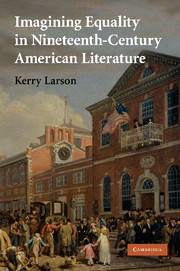PART III - EQUAL BUT SEPARATE
Published online by Cambridge University Press: 04 May 2010
Summary
I am myself; you are yourself; we are two distinct persons, equal persons. What you are, I am. You are a man, and so am I. I am not by nature bond to you, or you to me. Nature does not make your existence depend upon me, or mine upon yours. I cannot walk upon your legs, or you upon mine. I cannot breathe for you, or you for me; I must breathe for myself, and you for yourself.
Frederick Douglass, “Letter to His Old Master”Old Tiff is the name Harriet Beecher Stowe gives to the loyal slave of a destitute and dying woman and her three children in Dred: A Tale of the Great Dismal Swamp (1856). The name Old Tiff gives himself, on the other hand, is somewhat different. “I's Tiff Peyton, I is,” he explains, “raised on de great Peyton place.” “One of the most celebrated families in Virginia” (89), the Peytons, it is true, have fallen on hard times, the plantation now “worn-out and broken-down” and the daughter, Tiff's current mistress, disgraced and exiled for marrying a man below her station. Nevertheless, Old Tiff's devotion to the Peyton's “ancestral greatness” (89), which is forever on his mind, remains unshaken. So complete is his loyalty that Old Tiff, “though crooked and black, never seemed to cherish the slightest doubt that the whole force of Peyton blood coursed through his veins and that Peyton honor was intrusted to his keeping” (90).
- Type
- Chapter
- Information
- Imagining Equality in Nineteenth-Century American Literature , pp. 137 - 142Publisher: Cambridge University PressPrint publication year: 2008

